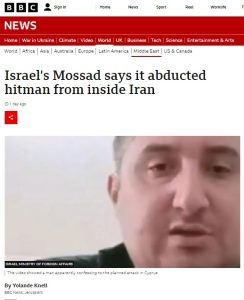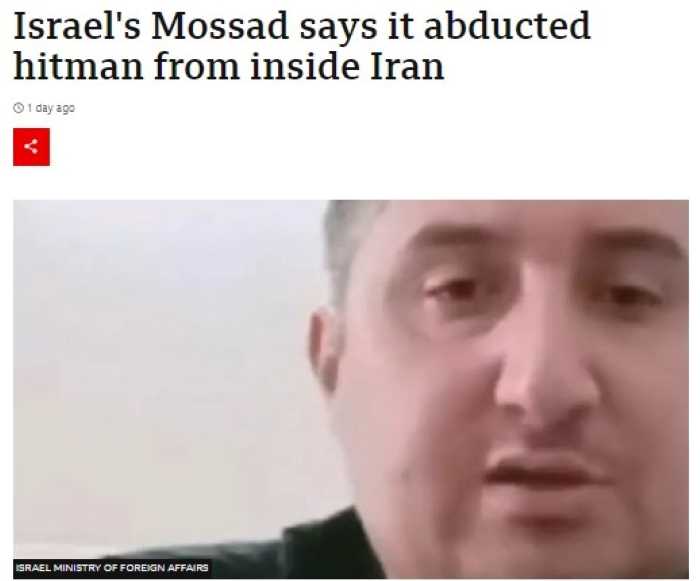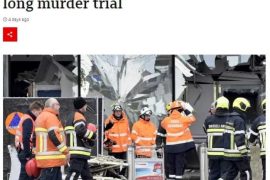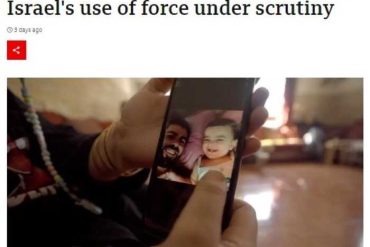On Sunday June 25th the media in Cyprus reported a story which was then picked up by Israeli outlets:
“A terror attack targeting Jews and Israelis was thwarted in Cyprus, it was reported by Cypriot media on Sunday.
According to the reports, the planned attack was believed linked to Iran’s Islamic Revolutionary Guard Corps, which is a branch of the Iranian army and is considered a terror organization by several countries, including the United States. […]
The Phile News website said the plot was thwarted by Cypriot intelligence services, in cooperation with other foreign agencies, said to be from Israel and the US.
The report said that the attackers were using the northern part of the island as a staging post for the potential attack and that Cypriot intelligence services had closely followed the cell for a number of months.”
Later the same day that report was confirmed in a statement put out by Israel’s Prime Minister’s Office.
BBC audiences did not see any coverage of that topic in the days that followed.
On June 29th the Israeli media reported a development in that story.
“Israel’s Mossad spy agency announced Thursday that in a special operation in Iranian territory, it had caught the Iranian terrorist sent to lead a planned terror attack against Israeli targets in Cyprus.
The Mossad named the man as Yousef Shahbazi Abbasalilo and published a video of his interrogation by its agents, in which he confessed to the plot and gave details on it. It said Abbasalilo was given weapons for the attack from senior officials in the Islamic Revolutionary Guard Corps (IRGC) and instructions on its implementation. The spy agency said the plan was to target Israeli businessmen in the small island nation.”
On the afternoon of the following day – Friday, June 30th – a report by the BBC Jerusalem bureau’s Yolande Knell appeared on the BBC News website’s ‘Middle East’ page under the headline “Israel’s Mossad says it abducted hitman from inside Iran”.
In the report’s opening paragraphs readers are told that:
“The case is the latest reminder of the continuing shadow war between Israel and Iran, which are long-time enemies.
An Israeli expert told the BBC that the unusual openness of Israeli intelligence could have been prompted by reports that the US has quietly restarted indirect talks with Iran to contain its nuclear programme.
“Israel’s interest here in publicising this is to show the world that you might be making a deal with Iran on its nuclear programme, but Iran is a far greater challenge,” comments Yaakov Katz, journalist and author of Israel Vs Iran: The Shadow War.
“It tries to assassinate businessmen in places like Europe; it does a lot more than just enrich uranium.””
That of course would have been the ideal point for Knell to inform BBC audiences about some of Iran’s additional activities, including the part it plays in the rise in terrorism in areas supposedly under the control of the Palestinian Authority. A few days before Knell’s article appeared, Yaakov Katz’s own paper reported a PA security source’s statements concerning Iranian funding for the Palestinian Islamic Jihad.
“The source said PIJ has become a dominant force in the northern West Bank, largely thanks to the financial aid it receives from Iran.
“Islamic Jihad is using Iranian money to buy weapons and loyalty in the West Bank,” the source said. “The organization is paying high salaries to its members.”
According to the source, the Palestinian Authority has noticed that there is increased cooperation between PIJ gunmen and members of al-Aqsa Martyrs Brigades, the armed wing of the ruling Fatah faction headed by PA President Mahmoud Abbas.
The PA security forces fear that scores of Fatah gunmen belonging to the Aqsa Martyrs Brigades are currently on the payroll of Iran – through its Palestinian proxy PIJ, the source added.
“Iran is already here, in the West Bank,” a Palestinian official in Ramallah claimed. “The Iranians want their Palestinian agents to extend their control from the Gaza Strip to the West Bank.””
Days later the head of the PIJ, Ziad Nakhaleh, confirmed those statements.
“He said that PIJ was also making its expertise in manufacturing explosive devices available to other groups. “We provide large and continuous [financial] assistance to the fighters in the field,” Nakhaleh disclosed. “We also follow up and provide field expertise in the process of manufacturing explosives.”
He said that his organization was working on instructions from Iran to increase terror attacks in the West Bank. He said that during his recent visit to Iran, he heard from Iranian leaders about the need to “arm the West Bank and develop the resistance there.”
According to Nakhaleh, the Palestinians’ relations with Iran have developed to a point where they gained experience in manufacturing weapons that are used against Israel.
“With the exception of machine guns, missiles, anti-tank weapons and explosives are manufactured locally,” he said. “Undoubtedly, we acknowledge that the Islamic Republic has provided assistance to the Palestinian resistance, including expertise, training and economic aid. There is also humanitarian aid to the families of the martyrs and the families of the prisoners.””
As we have noted here on numerous occasions over the past two years, the BBC’s reporting on the rise in terrorism perpetrated by groups based in Judea & Samaria has serially avoided (and in one recent case, actually denied) the topic of external involvement and support from Iran and Iranian funded terrorist organisations including Hamas, the PIJ and Hizballah. The BBC prefers instead to promote a narrative whereby local groups of disillusioned and frustrated ‘militants’ engage in ‘resistance’ against Israeli forces without informing its audiences of the broader regional factors at play.
Yolande Knell’s only brief and less than helpful reference to that topic in this report comes in the following paragraph: [emphasis added]
“For decades, Israel has viewed Iran as its greatest adversary, citing calls by the Iranian government for its destruction and Tehran’s backing of militant groups which carry out attacks against it.
Along with the US and Europe, it suspects Iran of seeking to develop nuclear weapons. Iran maintains its nuclear ambitions are peaceful.”
BBC audiences’ understanding of Israel’s approach to Iran would of course be vastly enhanced were the corporation’s correspondents to begin joining the dots between the Iranian nuclear programme, Iran’s attacks and attempted attacks on Israelis and Jews abroad – which often go underreported – and Iranian support for a variety of terror groups and proxies in the region, including those which have contributed to the rise in violence in Judea & Samaria over the past two years.
In this report, Yolande Knell once again avoids providing audiences with that background information which would also aid their understanding of other stories reported by the BBC.
Related Articles:
BBC CONTINUES TO BE ‘IMPARTIAL’ ON TERROR
BBC NEWS AGAIN IGNORES HIZBALLAH OPERATIONS IN CYPRUS
NO BBC FOLLOW-UP REPORTING ON ALLEGED CYPRUS TERROR PLOT
SUPERFICIAL BBC ARTICLE ON ‘IRAN-ISRAEL SHADOW WAR’ INVOKES TV DRAMA






Knell should go back to school but not the biased BBC internal journalistic school of hate and distortion practiced by her.